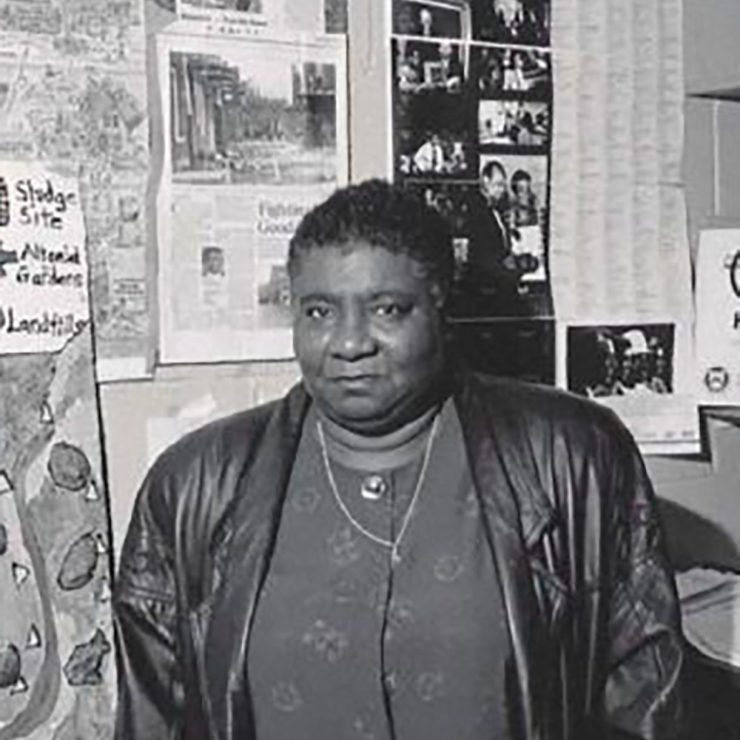To close out Black History Month this year and as a bridge to Women’s History Month that begins tomorrow, we want to showcase someone who was an outspoken advocate for social and environmental justice and is considered by many to be the mother of the environmental justice movement – Hazel M. Johnson.
Hazel Johnson was born in New Orleans, LA on January 25, 1935. Ms. Johnson lived in an area that is now called “Cancer Alley” due to the impacts from the local chemical industry. She was the only child of 4 to survive past her first birthday and by the time she was 12 years old, both of her parents had passed away as well. She moved to Los Angeles, back to New Orleans, and finally to Chicago as a young married woman, where she would spend the rest of her life. In 1962, Ms. Johnson and her family moved to a housing project on the South Side of Chicago called Altgeld Gardens Homes. Unfortunately, in 1969, her husband died of lung cancer. Doctors could not explain the cause of his lung cancer since he did not have any of the risk factors. This unexplained illness coupled with the number of skin and respiratory issues that her children had led Ms. Johnson to start to investigate the environmental conditions surrounding her neighborhood. She discovered that many other people in her neighborhood had lung and other cancers, many children were being born with birth defects, and other children suffered from similar skin and respiratory illnesses like her own children.
In 1979, Ms. Johnson founded the People for Community Recovery (PCR) to advocate for the issues facing her community. The results of her continued investigations through her organization were horrifying. Altgeld Gardens was in the center of a 14 mile ring that included 50 landfills, a chemical incinerator, a water and sewage treatment facility, steel mills, paint factories, scrap metal yards, and abandoned industrial dump sites. Not only that, but the housing project was built on top of a former industrial waste dump. No wonder the members of this community were getting sick! In 1995, Ms. Johnson is quoted as saying to the Chicago Tribune, “I was stunned and angry. I decided to make it my mission not only to find out what was really going on but also to do something about it.”
For the next 30 years, Ms. Johnson fulfilled her mission to bring justice for the Altgeld Gardens citizens and also to advocate for change on a national and international scale. For her local community members, she helped establish a new health clinic, initiated remediation of asbestos, lead, and PCB, and stopped the building or expansion of landfills in Chicago. She was a mentor to the next generation, ensuring that young environmental activists and college students were working to pick up the torch for the environmental justice movement. She even worked with a young community organizer who was trying to help with the asbestos removal in Altgeld Gardens. This young activist would go on to be the 44th President of the United States – Barack Obama. Ms. Johnson spoke on a national level, attending summits in DC to further advocate for the environmental atrocities occurring in low income and minority communities. In 1994, she was invited to witness President Clinton signing EO 12898, the executive order for Federal Actions to Address Environmental Justice in Minority Populations and Low-Income Populations. President Clinton went on to honor PCR two years later by declaring it one of the US’ top 100 environmental groups.
Even though it has been over 10 years since she passed away, Ms. Johnson continues to be an inspiration for her tireless work to combat environmental racism. Her legacy lives on through PCR, which is led by her daughter. She helped make the problems occurring in an invisible and underrepresented community on the South Side of Chicago a national problem that could no longer be ignored. Her work for her own community has inspired many across the US and throughout the world to view environmental justice on the same scale as air pollution or protecting endangered species. Just last year, the congressional representative for Ms. Johnson’s community in Chicago introduced legislation to classify April as Hazel M. Johnson Environmental Justice Month along with awarding her a Congressional Medal of Honor and her own postage stamp. We look forward to this opportunity to continue to honor her work.
For more information on Ms. Johnson’s legacy and the work PCR continues to do, check out their website to learn more. https://www.peopleforcommunityrecovery.org/.
